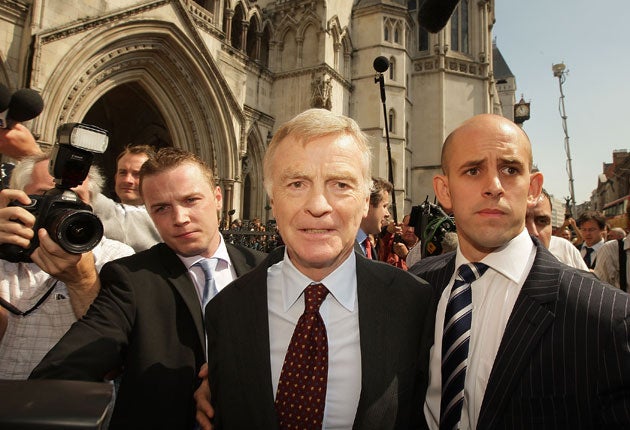European Court to rule on tighter UK privacy laws
Judges decide if Max Mosley should have been warned before being 'ambushed' by the press

Your support helps us to tell the story
From reproductive rights to climate change to Big Tech, The Independent is on the ground when the story is developing. Whether it's investigating the financials of Elon Musk's pro-Trump PAC or producing our latest documentary, 'The A Word', which shines a light on the American women fighting for reproductive rights, we know how important it is to parse out the facts from the messaging.
At such a critical moment in US history, we need reporters on the ground. Your donation allows us to keep sending journalists to speak to both sides of the story.
The Independent is trusted by Americans across the entire political spectrum. And unlike many other quality news outlets, we choose not to lock Americans out of our reporting and analysis with paywalls. We believe quality journalism should be available to everyone, paid for by those who can afford it.
Your support makes all the difference.Judges at the European Court of Human Rights will this week rule on whether the former world motor sports boss Max Mosley's right to privacy was invaded when he wasn't told about a story containing colourful claims about his sex life before it was published in the News of the World.
Victory for Mr Mosley would be landmark ruling that could, in effect, introduce a celebrity privacy law and could spell the death of so-called "kiss and tell" stories, according to some commentators. Critics claim any such ruling will lead to an explosion of controversial pre-emptive legal injunctions and have a "chilling" effect on freedom of expression.
Lawyers for Mr Mosley asked the judges in Strasbourg to make a ruling on whether the media should be legally forced to approach the subject of a story and provide "prior notification" of anything to be published about them. Mr Mosley has said such a ruling would prevent what he believes are "ambushes" by tabloid newspapers, in particular.
MPs on the Culture, Media and Sport Committee said last year in a press standards and privacy report that pre-notification would be "ineffective", and that there was a need for a "public interest" exception".
Mr Mosley said yesterday the judgment would have a bearing on only a small number of cases: "It's very rare for an exposé to be done when the person in question doesn't know. Asking for prior notification isn't really that big a deal. I know of only two cases, apart from my own, where people got ambushed and were given no advance notice, and in both cases they were advised not to sue. I have no idea what the outcome will be, but should we lose, I imagine we would want to seek leave to appeal."
Regardless of the outcome, the result is certain to stoke a growing row over UK privacy law. The Prime Minister, David Cameron, said recently he was "uneasy" about judges granting injunctions to protect the privacy of powerful individuals. He argued that Parliament, not judges, should decide on the balance between press freedom and privacy.
However, the Prime Minister was criticised for his comments when it was pointed out that judges were doing what Parliament had asked them to do after MPs voted for the Human Rights Act in 1997. Several judges, particularly Mr Justice Eady, have faced bitter criticism for a series of court privacy rulings, in which they try to balance the competing claims of a right to privacy under the Act and the media's freedom of expression.
In opposition, Mr Cameron said the Tories would abolish the Act and replace it with a British Bill of Rights, although he later said after becoming Prime Minister that this was subject to a "long-term policy review".
Opponents of the Act say foreign judges should not be determining what Britons are able to read over the breakfast table.
Hugh Tomlinson QC, a leading human rights lawyer, has admitted there is "disquiet" about the abdication of responsibility for a key area of British law to judges of 47 different legal traditions.
"If Parliament will not legislate and the Supreme Court will not take on the responsibility of developing a 'domestic human rights law' distinct from that of the Strasbourg court, this is the only remaining alternative," he argued.
"Under the influence of Strasbourg we are moving slowly but inescapably towards the stricter privacy protection of French or Italian law." The court has already made a number of rulings giving celebrities greater privacy protection. It ruled that photos of Princess Caroline of Monaco in public on a ski slope invaded her privacy, as there was no "public interest" justification.
Mr Tomlinson said a parliamentary Privacy Bill would allow MPs to give guidance to the courts on how to properly balance privacy and freedom of expression. He also suggested a statutory press regulator with greater powers than the current Press Complaints Commission.
Join our commenting forum
Join thought-provoking conversations, follow other Independent readers and see their replies
Comments